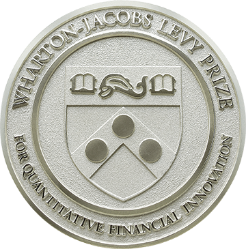PHILADELPHIA, September 10, 2019 — The Wharton-Jacobs Levy Prize for Quantitative Financial Innovation will be awarded to Ray Ball and Philip Brown at a conference hosted by the Jacobs Levy Equity Management Center for Quantitative Financial Research at the Wharton School of the University of Pennsylvania. The event will be held Friday, September 27 in New York.
Ball and Brown will receive the Wharton-Jacobs Levy Prize for work linking stock prices to accounting data, outlined in their 1968 Journal of Accounting Research paper “An Empirical Evaluation of Accounting Income Numbers.” The research demonstrated how earnings-related information is incorporated into share prices.
In addition to the prize ceremony, the conference program will feature paper presentations and a panel discussion on current topics that link accounting and finance. Speakers will include SEC Chief Economist S.P. Kothari, Leonid Kogan of the MIT Sloan School of Management, and Catherine Schrand of Wharton.
“We chose this year’s conference theme, Frontiers in Quantitative Finance, with Ball and Brown in mind,” said Christopher Geczy, academic director of the Jacobs Levy Center. “Throughout the program, we’ll explore how accounting information continues to be used in investing today.”
Both Australian, Ball and Brown met as doctoral students at the University of Chicago in the 1960s. Ball is now the Sidney Davidson Distinguished Service Professor of Accounting at the University of Chicago Booth School of Business, and Brown is a senior honorary research fellow and an emeritus professor at the University of Western Australia.
In 2019, they published a replication of the 1968 paper to commemorate its 50th anniversary. Appearing in a special issue of Pacific-Basin Finance Journal, “Ball and Brown (1968) After Fifty Years” details the research design of the original paper and the authors’ observations on its impact.
“This work by Ball and Brown was incredibly innovative in that it changed the perception of accounting figures in the investing world,” said Geoffrey Garrett, Dean of the Wharton School. “It laid the foundation for much of the research to follow in accounting and finance.”
A committee of academics and financial practitioners selected Ball and Brown to receive the Wharton-Jacobs Levy Prize, an $80,000 award. The Prize is endowed with a $2 million gift from Bruce I. Jacobs G’79, GrW’86 and Kenneth N. Levy WG’76, G’82, Principals and Co-Founders of Jacobs Levy Equity Management. It is given biennially to recognize excellence in quantitative research that has contributed to a particular innovation in the practice of finance.
“Ball and Brown’s 1968 paper ignited a revolution in accounting and capital markets research,” said Jacobs, who served as Chair of the selection committee. “Their influential work linking stock prices to accounting data opened the door to new empirical research in finance and paved the way for innovations in the practice of investment management.”
The conference and Wharton-Jacobs Levy Prize ceremony will be held at the New York Marriott Marquis. Event sponsors include Jacobs Levy Equity Management and Portfolio Management Research. For the full agenda and to register, visit: http://bit.ly/2019JLC.
About the Jacobs Levy Center
Led by Professor Chris Geczy, PhD, C’90, and established through the vision and generosity of Bruce Jacobs, G’79, GRW’86, and Ken Levy, WG’76, G’82, the Jacobs Levy Equity Management Center for Quantitative Financial Research at the Wharton School of the University of Pennsylvania is dedicated to the advancement of quantitative finance, at the intersection of theory and practice, through the creation and dissemination of innovative knowledge.
About the Wharton School
Founded in 1881 as the world’s first collegiate business school, the Wharton School of the University of Pennsylvania is shaping the future of business by incubating ideas, driving insights, and creating leaders who change the world. With a faculty of more than 235 renowned professors, Wharton has 5,000 undergraduate, MBA, executive MBA, and doctoral students. Each year 18,000 professionals from around the world advance their careers through Wharton Executive Education’s individual, company-customized, and online programs. More than 99,000 Wharton alumni form a powerful global network of leaders who transform business every day. For more information, visit www.wharton.upenn.edu.



